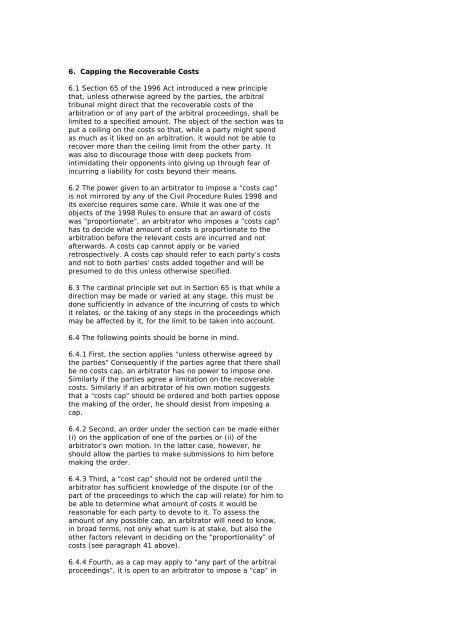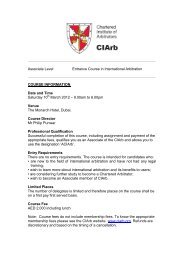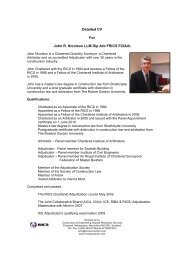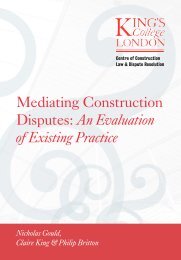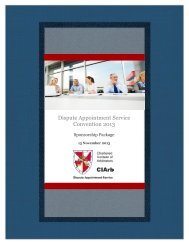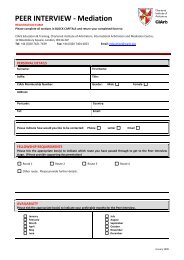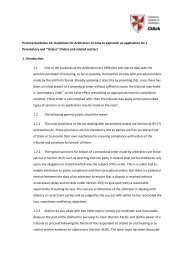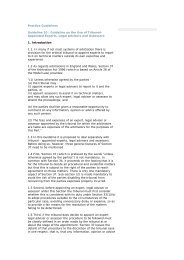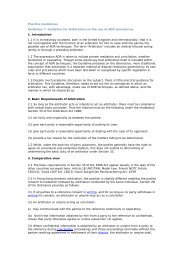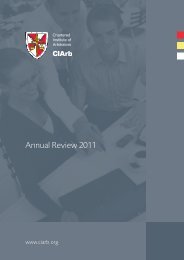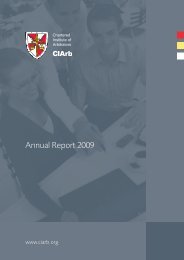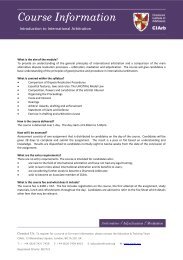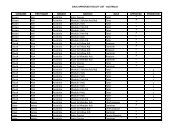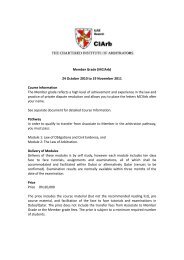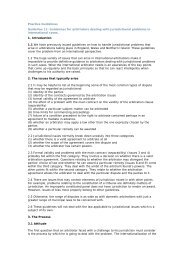Practice Guidelines - CIArb
Practice Guidelines - CIArb
Practice Guidelines - CIArb
Create successful ePaper yourself
Turn your PDF publications into a flip-book with our unique Google optimized e-Paper software.
6. Capping the Recoverable Costs<br />
6.1 Section 65 of the 1996 Act introduced a new principle<br />
that, unless otherwise agreed by the parties, the arbitral<br />
tribunal might direct that the recoverable costs of the<br />
arbitration or of any part of the arbitral proceedings, shall be<br />
limited to a specified amount. The object of the section was to<br />
put a ceiling on the costs so that, while a party might spend<br />
as much as it liked on an arbitration, it would not be able to<br />
recover more than the ceiling limit from the other party. It<br />
was also to discourage those with deep pockets from<br />
intimidating their opponents into giving up through fear of<br />
incurring a liability for costs beyond their means.<br />
6.2 The power given to an arbitrator to impose a “costs cap”<br />
is not mirrored by any of the Civil Procedure Rules 1998 and<br />
its exercise requires some care. While it was one of the<br />
objects of the 1998 Rules to ensure that an award of costs<br />
was “proportionate”, an arbitrator who imposes a “costs cap”<br />
has to decide what amount of costs is proportionate to the<br />
arbitration before the relevant costs are incurred and not<br />
afterwards. A costs cap cannot apply or be varied<br />
retrospectively. A costs cap should refer to each party’s costs<br />
and not to both parties’ costs added together and will be<br />
presumed to do this unless otherwise specified.<br />
6.3 The cardinal principle set out in Section 65 is that while a<br />
direction may be made or varied at any stage, this must be<br />
done sufficiently in advance of the incurring of costs to which<br />
it relates, or the taking of any steps in the proceedings which<br />
may be affected by it, for the limit to be taken into account.<br />
6.4 The following points should be borne in mind.<br />
6.4.1 First, the section applies “unless otherwise agreed by<br />
the parties” Consequently if the parties agree that there shall<br />
be no costs cap, an arbitrator has no power to impose one.<br />
Similarly if the parties agree a limitation on the recoverable<br />
costs. Similarly if an arbitrator of his own motion suggests<br />
that a “costs cap” should be ordered and both parties oppose<br />
the making of the order, he should desist from imposing a<br />
cap.<br />
6.4.2 Second, an order under the section can be made either<br />
(i) on the application of one of the parties or (ii) of the<br />
arbitrator’s own motion. In the latter case, however, he<br />
should allow the parties to make submissions to him before<br />
making the order.<br />
6.4.3 Third, a “cost cap” should not be ordered until the<br />
arbitrator has sufficient knowledge of the dispute (or of the<br />
part of the proceedings to which the cap will relate) for him to<br />
be able to determine what amount of costs it would be<br />
reasonable for each party to devote to it. To assess the<br />
amount of any possible cap, an arbitrator will need to know,<br />
in broad terms, not only what sum is at stake, but also the<br />
other factors relevant in deciding on the “proportionality” of<br />
costs (see paragraph 41 above).<br />
6.4.4 Fourth, as a cap may apply to “any part of the arbitral<br />
proceedings”, it is open to an arbitrator to impose a “cap” in


